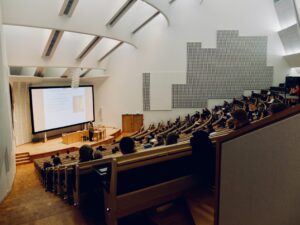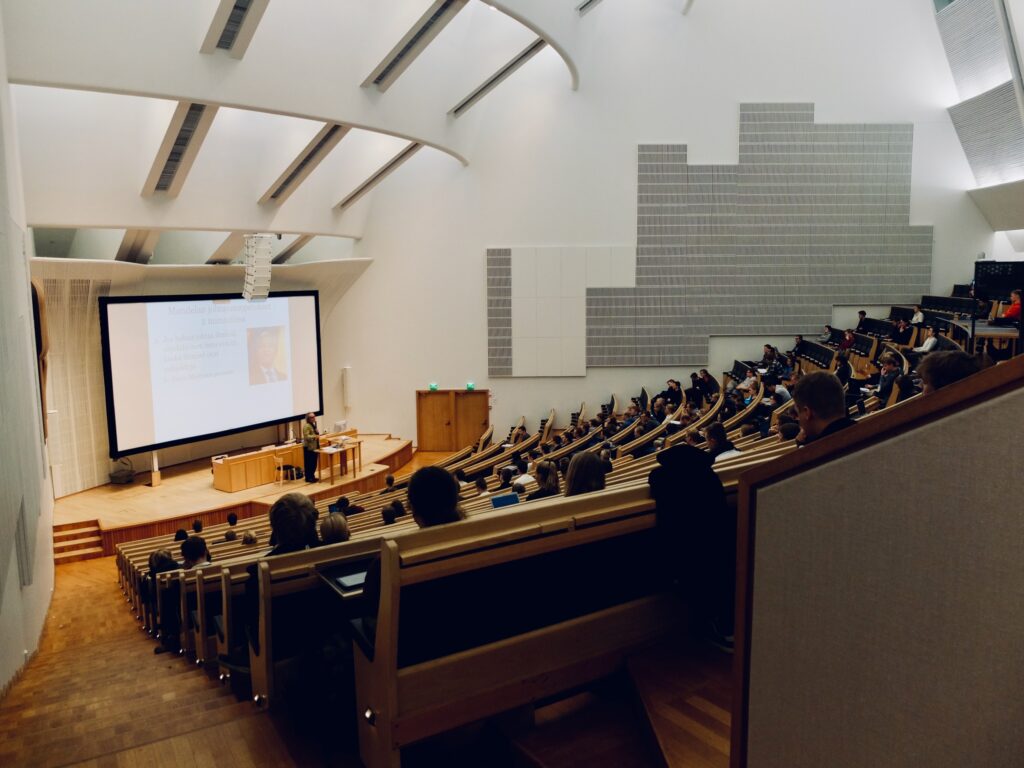By Morgan Kleinhandler
The rise in technology and the COVID-19 pandemic have caused an increase in interconnectedness through the internet.[1] The pandemic specifically has led to an increase in higher education utilizing remote learning and online test-taking options.[2] Most colleges and universities were forced during the beginning and peak of the pandemic to move classes and examinations online, which has resulted in new ways for students to be academically dishonest during examinations.[3]
Recently, David Berkovitz, an assistant professor at Chapman University in California, has taken legal action against such academic dishonestly.[4] When he discovered that his confidential exam questions had been uploaded to a subscription website geared towards college students, Berkovitz filed suit against the students who submitted the questions.[5] Berkovitz argued that the exam questions constitute copyrighted material that he owns.[6] The lawsuit has since reached national headlines, prompting a nationwide discussion over the copyright protection of university materials.[7]
Federal statutes primarily establish copyright law in the United States, which protects the ownership rights of an author of an original work.[8] The Copyright Act of 1976, codified as Title 17 of the United States Code, governs federal copyright law and establishes what materials are protected by copyrights and how such protection is established.[9] Specifically, 17 U.S.C. § 102 provides that “original works of authorship fixed in any tangible medium of expression” are protected by copyright law.[10] This protection would extend to Berkovitz’s examination questions in the case at hand because he wrote them himself.[11] Regardless of whether the students were given the question on physical paper or through electronic means, these originally developed questions would be considered “fixed in . . . [a] tangible medium of expression.”[12]
Although Berkovitz’s examination questions are undoubtedly copyrightable material so long as he wrote the questions himself, there is still the question of who would own the copyright in question. Section 201(b) of the Copyright Act states that absent an express, written, and signed agreement otherwise, when an actor creates original works of authorship as an employee within the scope of employment, the employer owns the rights to the copyrighted work.[13] In Berkovitz’s case, it seems that such an agreement had been put in place by his employer, Chapman University.[14] In a press release, Chapman University stated that it allows its professors to maintain ownership over copyrightable works that they create.[15] Therefore, so long as a written agreement signed by both parties exists, Berkovitz would have ownership over the examination questions released by his students.
Although there is an exception to copyright protection allowing for limited use of protected materials without author permission, it is unlikely that the students in this case would be protected by this exception. Despite copyright law’s protection of authors’ rights to ownership over their works, this exception, known as the fair use doctrine, exists to allow for some limited but legal use of copyrighted material without first obtaining the author’s permission.[16] In order to use copyrighted material under the fair use doctrine, 17 U.S.C. § 107 lays out four factors that courts use to analyze fair use:
(1) the purpose and character of the use, including whether such use is of a commercial nature or is for nonprofit educational purposes;
(2) the nature of the copyrighted work;
(3) the amount and substantiality of the portion used in relation to the copyrighted work as a whole; and
(4) the effect of the use upon the potential market for or value of the copyrighted work.[17]
In the case at hand, the students leaked Berkovitz’s questions to a for-profit website, meaning the first § 107 factor would likely not weigh in the students’ favor. Further, because the materials leaked were confidential examination questions that would be useless to the professor if students had access to the questions before the test, the second factor of the fair use doctrine test would similarly weigh against fair use. This reasoning means the third factor also weighs against fair use because the substance of the confidential questions would be deemed useless by the author, Berkovitz, once students have access to them prior to examinations.
Finally, because of the confidential nature of the examination questions and the importance of fairness in the university examination process, the fourth factor would also weigh against the students’ favor. While the fair use doctrine was designed to allow for limited use of copyrighted material “to promote freedom of expression,” through certain kinds of uses, taking copyrighted material for the purpose of cheating on university examinations would most likely fall outside of this purpose.[18]
Federal Copyright protection is an important aspect of the law that protects author ownership and promotes creativity and innovation.[19] With the new rise in online examination in higher education, Berkovitz’s lawsuit against students who leaked his copyrighted questions serves as a reminder to university students across the country that professor-made materials are owned by professors and may not legally be given to for-profit websites to promote cheating.
[1] Apurvakumar Pandya & Pragya Lodha, Social Connectedness, Excessive Screen Time During COVID-19 and Mental Health: A Review of Current Evidence, Frontiers Hum. Dynamics (July 22, 2022), https://www.frontiersin.org/articles/10.3389/fhumd.2021.684137/full.
[2] Sean Gallagher & Jason Palmer, The Pandemic Pushed Universities Online. The Change Was Long Overdue., Harv. Bus. Rev. (Sept. 29, 2020), https://hbr.org/2020/09/the-pandemic-pushed-universities-online-the-change-was-long-overdue.
[3] Id.; Sneha Dey, Reports of Cheating at Colleges Soar During the Pandemic, NPR (Aug. 27, 2021), https://www.npr.org/2021/08/27/1031255390/reports-of-cheating-at-colleges-soar-during-the-pandemic#:~:text=The%20university%20has%20seen%20reports,these%20students%20who%20were%20cheating.%22.
[4] Cherri Mossburg, Professor Files Lawsuit to Find Students Who Posted Exam Questions Online, CNN (March 20, 2022), https://www.cnn.com/2022/03/18/us/professor-lawsuit-exam-questions-leaked/index.html.
[5] Id.
[6] Id.
[7] Id.; Jaclyn Peiser, A Professor Found His Exam Questions Posted Online. He’s Suing the Students Responsible for Copyright Infringement., Wash. Post (March 17, 2022), https://www.washingtonpost.com/nation/2022/03/17/chapman-university-professor-lawsuit-copyright-cheating/.
[8] 17 U.S.C. § 102.
[9] Id.
[10] Id.
[11] Id.; Mossburg, supra note 4.
[12] Id.; Copyright and Fair Use, Harv. U., https://ogc.harvard.edu/pages/copyright-and-fair-use.
[13] 17 U.S.C. § 201(b).
[14] Mossburg, supra note 4.
[15] Id.
[16] 17 U.S.C. § 107.
[17] Id.
[18] More Information on Fair Use, Copyright.gov, https://www.copyright.gov/fair-use/more-info.html#:~:text=Fair%20use%20is%20a%20legal,protected%20works%20in%20certain%20circumstances.
[19] Understanding Your Copyrights, Creative L. Ctr., https://creativelawcenter.com/understanding-copyrights/#:~:text=The%20purpose%20of%20copyright%20law,%2C%20learning%2C%20and%20creative%20work.


